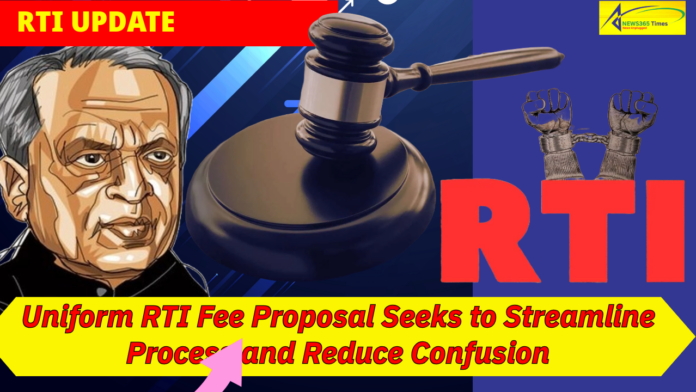In a significant move towards simplifying the Right to Information (RTI) process in India, veteran RTI activist Subhash Chandra Aggarwal has filed a petition with the Central Information Commission (CIC) advocating for a uniform RTI fee structure. The petition proposes a fixed RTI application fee of ₹50, inclusive of copying charges for the first 20 pages. This initiative aims to eliminate discrepancies and confusion in fee collection while ensuring a more transparent and applicant-friendly RTI framework.

The Petition and Its Basis
The petitioner, Subhash Chandra Aggarwal, encountered a challenge when he submitted an RTI application to the Department of Justice. Despite having already paid ₹50 as the RTI fee, the Gujarat High Court requested an additional “deficit application fee.” This inconsistency prompted Aggarwal to appeal to the CIC, seeking intervention against such irregularities.
Aggarwal has urged the CIC to direct the Assistant Public Information Officer (APIO) at the Gujarat High Court to provide the requested information free of charge under Section 7(6) of the RTI Act. Furthermore, he has requested penal action against the concerned APIO for withholding information without proper justification.
Call for Uniform RTI Fee Structure
A key aspect of Aggarwal’s petition is his recommendation to the Department of Personnel & Training (DoPT) to introduce a standard RTI fee of ₹50 across all central and state public authorities. The proposed fee would include the cost of copying the first 20 pages, thereby eliminating the need for separate charges for initial copies. This move is expected to simplify the process, reduce ambiguity, and prevent potential misuse of the RTI Act by authorities imposing varying fees.
Advantages of a Fixed RTI Fee
- Simplification of Process: A uniform RTI fee would create a standardized procedure, making it easier for applicants to understand and comply with fee requirements.
- Reduction of Confusion: Disparities in RTI fee structures across different public authorities often lead to confusion among applicants. A fixed fee would eliminate such inconsistencies.
- Economic Viability: The proposed ₹50 fee would be economical for both RTI applicants and public authorities, ensuring that the process remains accessible without excessive financial burden.
- Protection for BPL Applicants: RTI applicants from the Below Poverty Line (BPL) category, who are already exempt from paying RTI fees, will continue to benefit from this exemption, ensuring that the economically weaker sections are not disadvantaged.
Potential Impact and Future Considerations
The CIC is expected to review and decide on the petition in the coming days. If the recommendation is accepted, it could mark a significant shift in RTI fee structures, ensuring greater uniformity and accessibility. This development would further strengthen the RTI Act’s role in promoting transparency and accountability in governance.
The move is likely to receive support from RTI activists and civil society organizations advocating for a more applicant-friendly and transparent information access system. If implemented, this proposal could serve as a precedent for other procedural reforms within the RTI framework, enhancing the efficiency and effectiveness of the Act.
Subhash Chandra Aggarwal’s petition brings attention to the pressing need for a standardized RTI fee system. By eliminating inconsistencies and streamlining the application process, this initiative has the potential to make the RTI mechanism more efficient and user-friendly. As the CIC deliberates on this matter, its decision could pave the way for a significant improvement in the accessibility and effectiveness of the Right to Information Act in India.




